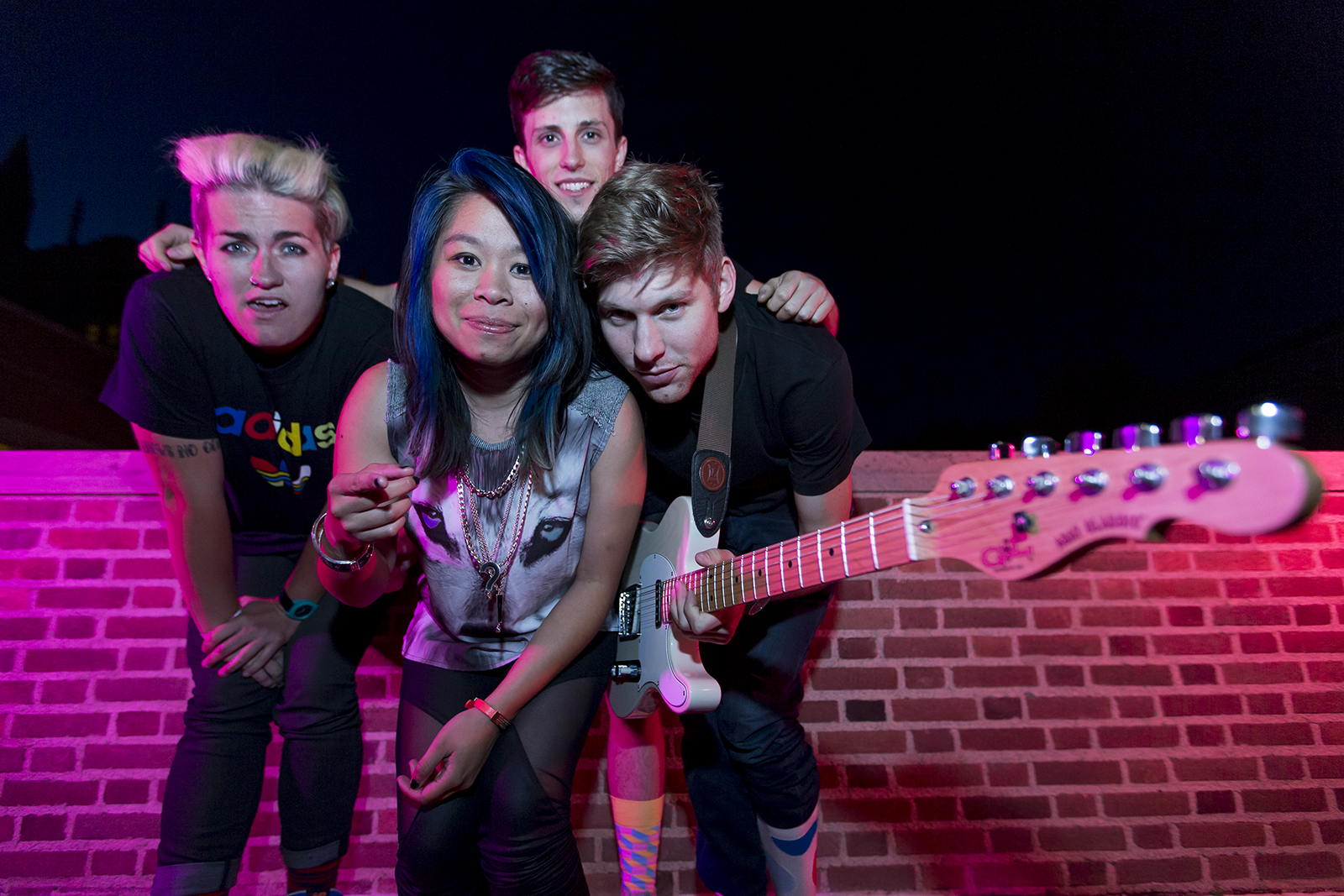Pop band WASI seeks to emulate positive energy with release of EP

Jessie Meehan (far left) and UCLA alumna Merilou “Cosmo” Salazar (left), Garrett Harney (center) and Dylan Robin (right) are members of the riot pop band WASI. The band is releasing its first EP “Bleed Pop” Tuesday. Bassist Meehan said WASI’s music is inspired by the Riot Grrrl movement of the 1990s. Frequently performing in DIY venues and the LGBT music scene, the band strives to create a sense of community in its shows, said drummer Harney. (Aubrey Yeo/Daily Bruin senior staff)
By Benjamin Pollock
May 19, 2015 12:59 a.m.
Jessie Meehan, the bassist of riot pop band We Are / She Is, said in high school, when the teacher would assign a presentation, a knot would grow in her stomach because she was afraid to talk in front of the class.
Today, Meehan said music has made her drastically more outgoing, happy and comfortable as a person. Meehan, along with UCLA alumna Merilou “Cosmo” Salazar formed WASI, an acronym for We Are / She Is. Alumni Dylan Robin and Garrett Harney joined the group in early 2015. Harney said WASI’s presence could fit into any “two-left-feet community.”
“Bleed Pop,” WASI’s first extended play, is set to release Tuesday. All band members said that dancing, smiling and rainbows should accompany the EP’s fun harmonies, crisp production and infectious pop sound.
Meehan said the lyrics of WASI’s music are influenced by the Riot Grrrl movement of the 1990s, which reflects politically charged angst. Meehan and Salazar said their hardships growing up as lesbians in a conservative area of Orange County are also reflected in their music.
WASI was born when Salazar approached Meehan about starting a band during a high school physics class in 2006. Even though Meehan was a novice bassist, she agreed to form the band and play at a show Salazar booked two weeks later.
“It was too hard for us to learn covers, so we just wrote a bunch of crappy punk songs and called ourselves The Midol Poppers,” Meehan said.
Nine years later, in early 2015, WASI became its current four-piece band. The band, completed with Harney and Robin, played its first official show together at the Smell, a do-it-yourself venue in downtown Los Angeles. DIY venues are generally run by volunteers who wish to maintain the free expression of the DIY community.
Harney, who has been playing at DIY venues since his teens, said DIY scenes are special because they convey a sense of community to their members. Harney said WASI strives to create a similar sense of togetherness at its shows.
“We want our music to appeal to a sense of community.” Harney said. “People who come to our shows might be down and out – they may feel like they have nowhere to go – but they should feel at home at our shows.”
As Meehan and Salazar identify as active members of the lesbian, gay, bisexual and transgender community, they said WASI has found a niche fan base through LGBT-related shows like rallies and pride festivals. The band once played at a mansion party that featured lesbian and queer speed dating. Harney and Robin embrace WASI’s role as a band in the LGBT music scene because they said their involvement in the movement establishes the type of fun-loving community the band strives for.
This fun-loving spirit is embodied in “Can’t Dance,” an anthem in “Bleed Pop” that Salazar said best represents the EP because it focuses on owning oneself. Harney said the lyrics “We can’t dance/ But we can party all night,” embody having fun despite being different from the mainstream, a common theme in WASI’s music.
“I think when we started playing music, we didn’t want to be labeled as an LGBT band, but then we found a home in the punk community within the LGBT scene,” Salazar said. “At those shows, everyone is so prideful, inspired and empowered.”
Robin said he believes the positive energy from the LGBT music scene allows the band to organically grow music. While WASI would love to be the biggest band in the world, Harney said the group would love to be the face of LGBT pop music because the band embodies the LGBT communities’ positive attitude when facing uphill battles.
Uphill battles are the focus of the final song, “And the World,” a track that Meehan said lyrically reflects the hardships of angst and parental struggles.
“Dad’s back from the hide-and-seek games,” sings Salazar. “He’s shootin’ but he’s missin’ and he barely knows my name.”
Meehan said the lyrical strife of the song is masked by its dance-pop composition. Salazar said that the band usually closes their shows with “And the World,” simply because the crowd responds energetically to the song’s sing-along feel.
“We just want everyone to feel at home at our shows,” Harney said. “Fans shouldn’t have to care about looking like an idiot or dancing weird or being gay or being straight.”
As for the band’s future, Meehan said WASI wants to continue to spread positivity and happiness through its music.
“Have fun no matter who tells you not to,” Robin said. “WASI wants to emulate the idea that no matter where you’ve been, and no matter where you’re going, you should enjoy yourself at every moment.”


